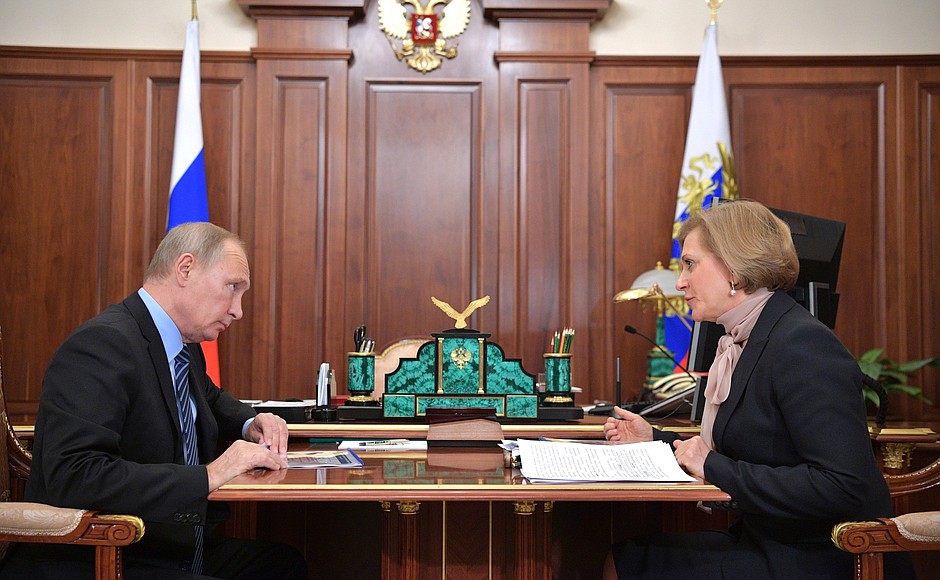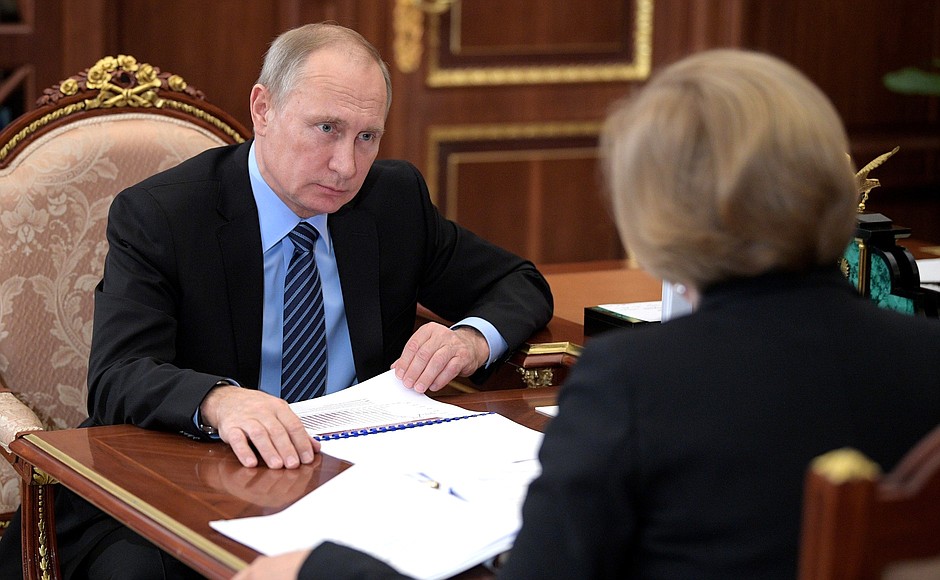The issues discussed included the main areas of the organisation’s activity: provision of epidemiological security, strengthening of safe unified epidemiological space, monitoring of infectious diseases, biological risks and the global epidemiological situation.
* * *
President of Russia Vladimir Putin: Ms Popova, what will you begin with?
Head of the Federal Service for the Oversight of Consumer Protection and Welfare Anna Popova: I would like to begin with infectious diseases. Let me show you the documents. I would like to say that in order to prevent infection spread, Rospotrebnadzor is focusing on three areas: providing epidemiological and biological security in the Russian Federation, strengthening the safe unified epidemiological space in the countries of the Eurasian Economic Union and monitoring global infection threats and biological risks in general. Today, infectious pathogens travel at the speed of an airliner, and these risks are always relevant.
The unified integrated system of epidemiological oversight in the Russian Federation allows keeping the morbidity rate of many contagious diseases at a stable level and has also lowered the incidence rate of rubella, pertussis, measles, diphtheria, zoonotic infections and other diseases in the first ten months of this year. We have also lowered by 5 percent the morbidity rate of tick-borne encephalitis (by 10 percent last year) and other infections.
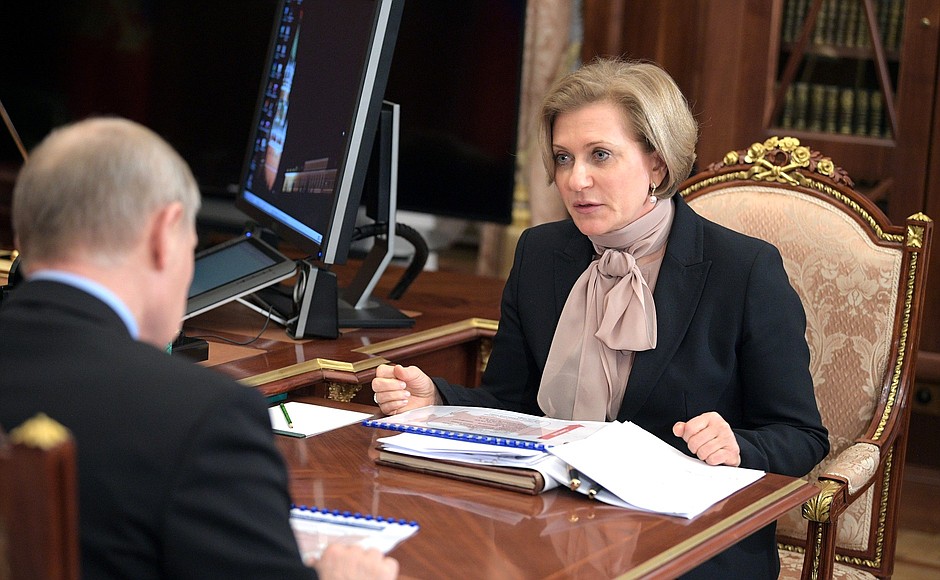
To prevent infection from reaching Russia, we implement control measures on the border, which complies with our functions of sanitary protection. To ensure effectiveness, we have adopted 27 new regulatory documents over the past few years.
We inspect some 23 million people at border checkpoints every year, and the number of infections we detect has increased almost 2.5-fold over the past five years. This is the measure of our efficiency. We stop agents capable of causing communicable diseases on the border and hence ensure epidemiological stability in Russia.
Vladimir Putin: Yet agents manage to enter the country, do they?
Anna Popova: Yes, of course. It is impossible to stop all infectious agents from entering the country. Our main task is to prevent the diseases from spreading, which we are doing quite well now. We also do this during public events, including sports events. This is an important part of our job, which we are doing as well as we can.
International cooperation is a major element. It concerns the former Soviet republics, where we are implementing four programmes, including a programme to reduce the risk of particularly dangerous infections and a programme against the plague, which includes containing cross-border plague hotbeds.
This year we worked on a large area in the Altai Mountains to contain the spread of plague, which we did together [with our partners] from the territory of Mongolia. I can tell you that we have restored epidemiological stability there. The measures we took turned out to be very effective.
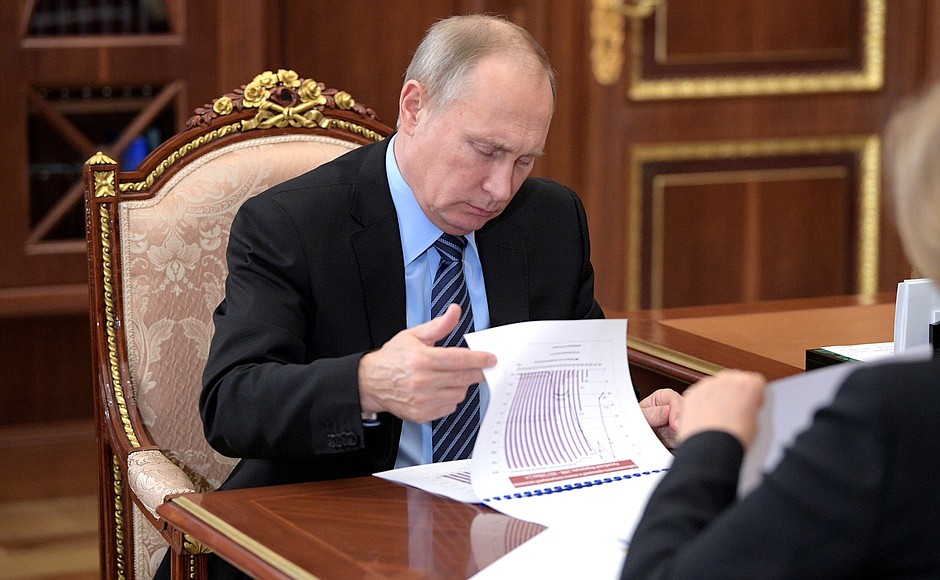
However, taking such measures in only one country is not enough, because the animals that spread this disease cross the border freely. This is why, acting on your instructions under an approved programme, we have applied treatment measures in that region. Next year, we will work in that region with Kazakhstan so as to reduce the risk of plague spreading and prevent the active phase.
Likewise, the measles and poliomyelitis programmes in Eurasian countries and a programme to reduce the HIV spread are our common concern, along with the programme on ensuring compliance with and implementation of international medical and sanitary norms in the Eurasian countries and former CIS states.
The international component is very important to us as well; the recent Sochi conference was one of its elements. It was the first international conference on biosecurity challenges and risks held as part of a programme to implement the Convention on Biological and Toxin Weapons.
A total of 27 countries accepted our invitation to the conference, which was attended by 120 delegates who unanimously supported the decision under which the Geneva conference in December should recommend supporting the continued efforts in this sphere between conferences. The assessment of biological risks made at this conference has again highlighted the importance of this work and task.
Vladimir Putin: How many people attended the conference?
Anna Popova: Everyone we had invited – 120. The conference was crowned with a statement by the chairperson, who expressed the participants’ unanimous support for the idea of biological risk protection and for the Convention on Biological and Toxin Weapons.
Here is the data showing a decrease in the disease rate depending on immunisation. These clear examples show that immunisation has become a problem. The rate of measles and diphtheria is high in some European countries, unlike in Russia.
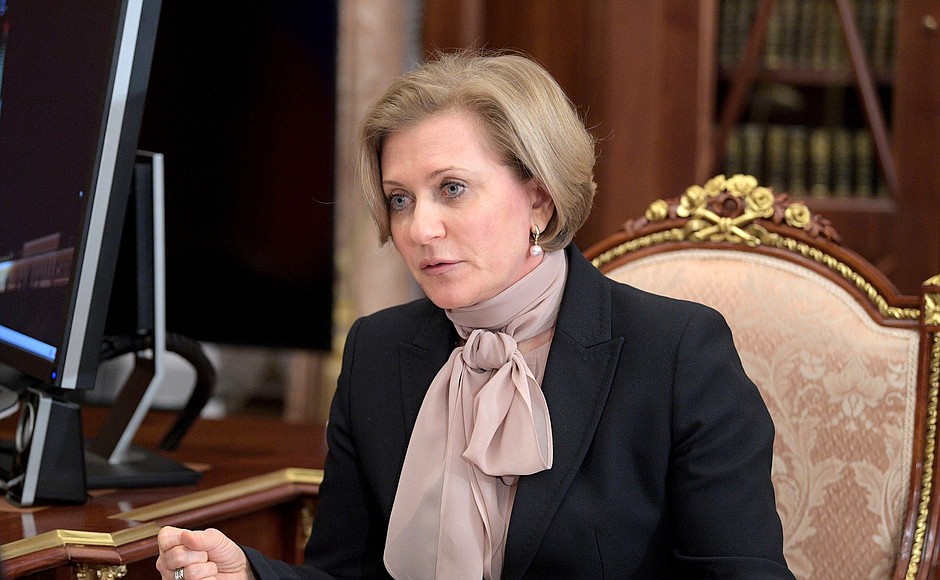
Vladimir Putin: Is it because they neglect immunisation?
Anna Popova: Yes, this is the result of immunisation neglect and a high migration level.
Vladimir Putin: Do you mean they reject vaccination?
Anna Popova: Exactly.
Vladimir Putin: Is this a modern trend?
Anna Popova: Regrettably, it is, and the internet community is actively promoting it.
Vladimir Putin: Do you see this as a threat?
Anna Popova: The number of vaccination rejections [in Russia] does not exceed 5 percent of the vaccinated in the given age group.
Vladimir Putin: Have you noticed a growth of these diseases in the countries where people neglect immunisation?
Anna Popova: Yes, certainly. Nearly 7,000 people have measles in Romania, and many measles cases have been reported in Spain and Italy, whereas the number of measles patients in Russia is about 170 this year. Regrettably, several measles patients have died in Europe.
This is also true of diphtheria: this disease has been reported in Europe, but not in Russia. In other words, migrants can bring the disease to Russia. The cross-border movement of people is very intensive, which is why there is such a risk.
As for our work in foreign countries, we have accumulated positive experience, which has won the appreciation of the UN and the WHO. I am referring to our work in Guinea. I would like to say a few words about it.
Vladimir Putin: Yes, of course, go ahead.
<…>
